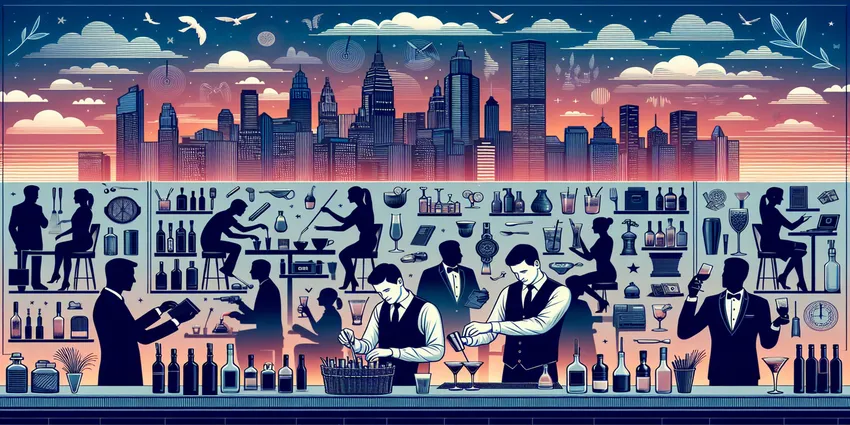Bartender Skill Checklist: Key Takeaways
- Bartenders must master both technical skills like mixology and cash handling and soft skills such as communication and multitasking.
- Technical skills include cocktail crafting techniques, equipment use, inventory management, and adherence to safety regulations.
- Soft skills like customer service excellence, adaptability, problem-solving, and physical stamina are essential for success behind the bar.
Excelling as a bartender requires a balance of technical know-how and interpersonal abilities. This checklist outlines the critical skills needed to provide top-tier service and efficient bar management.
Whether you’re starting out or seeking to enhance your bartending career, focusing on these areas will help you thrive in a fast-paced hospitality environment.
Employers looking to build strong bar teams should consider how to hire a bartender that customers love as a resource to attract the best talent.
1. Technical Skills for Bartenders Needed to Excel
Bartending demands precise knowledge and abilities related to drink preparation and bar operations. These technical skills form the foundation for delivering quality beverages consistently.
Mixology Proficiency: Essential for Bartenders
Understanding spirits, liqueurs, mixers, and garnishes is vital. Bartenders should be proficient in preparing both classic cocktails like martinis and mojitos, as well as modern, innovative drinks.
Mastery in balance and flavor ensures customer satisfaction and repeat business.
Learn more about the mixologist interview questions to understand the level of skill bartenders are expected to have in mixology proficiency.
Core Bartending Techniques for Quality Drinks
Techniques such as shaking, stirring, muddling, layering, and free-pouring create not only the right taste but also visual appeal.
Skillful execution of these methods reflects professionalism and elevates the drinking experience.
Speed, Efficiency, and Equipment Knowledge
Working swiftly, especially during peak hours, keeps customers happy and operations smooth.
Knowing how to safely and effectively use shakers, strainers, jiggers, blenders, and other bar tools underpins this efficiency.
Inventory Management, Cash Handling, and Health & Safety
Tracking stock levels and anticipating ingredient needs prevent service interruptions.
Proficiency with cash registers or POS systems and handling payments accurately protects financial integrity.
Adhering to health and safety standards, including sanitation and responsible alcohol service, safeguards customers and the establishment.
For managers, understanding the inventory manager job description can aid in better supporting bartender and bar inventory needs.
2. Soft Skills for Bartenders to Deliver Exceptional Service
Beyond technical abilities, bartenders must engage customers and collaborate with teams effectively through strong soft skills.
Customer Service Excellence and Communication
Providing friendly, attentive service and managing complaints tactfully boosts customer loyalty.
Clear, effective communication with patrons and coworkers ensures smooth order processing and a welcome atmosphere.
Employers can improve service by reviewing how to hire top servers or waiters and the soft skills needed in customer service roles.
Multitasking, Time Management, and Teamwork
Bartenders juggle multiple orders and responsibilities simultaneously without sacrificing quality.
Collaborating with servers, kitchen staff, and management contributes to seamless bar and restaurant function.
Adaptability, Composure, and Problem-Solving Skills
Remaining calm under pressure, such as during busy hours or stressful situations, is critical.
Quickly resolving conflicts or operational issues maintains service standards and customer satisfaction.
Tips for employers on how to hire high performers include evaluating problem-solving and composure skills in candidates.
Attention to Detail and Physical Stamina Are Also Key
Ensuring accurate drink preparation, order fulfillment, and cleanliness heightens efficiency and professionalism.
Bartending often requires standing long hours, lifting heavy items, and working at a fast pace, demanding good physical health.
3. Building the Complete Bartender Skillset for Career Success
Combining these technical and soft skills makes a bartender not only competent but exceptional.
Continuous training and real-world experience sharpen these skills, helping bartenders adapt to evolving beverage trends and customer expectations.
Employers value those who contribute to a positive workplace environment and customer experience, leading to career growth opportunities.
For more insights on bartender careers and job expectations, explore the bartender job description page.
4. Additional Resources to Enhance Bartender Skills
For those seeking structured learning and certification, many reputable organizations offer valuable programs.
- U.S. Department of Labor – Occupational Outlook for Bartenders provides career insights, job outlook, and essential skills.
- National Restaurant Association – ServSafe Alcohol Training offers certification focused on responsible alcohol service.
- Occupational Safety and Health Administration (OSHA) – Guidelines for Restaurants and Bars details health and safety regulations you must know.
Additional helpful employer-focused insights can be found in the spotlight on bartender health and safety.
Bartender Skill Checklist: Conclusion
Excelling behind the bar requires mastering a blend of precise technical skills and strong interpersonal abilities.
From mixology knowledge and equipment handling to excellent communication and adaptability, each skill plays a vital role in delivering outstanding service.
By consistently honing both skill sets and leveraging available resources, bartenders can build rewarding careers and elevate the customer experience at their establishments.
For employers interested in recruiting great bartenders, the bartenders for hire in New York spotlight offers practical hiring advice.










Loading comments...